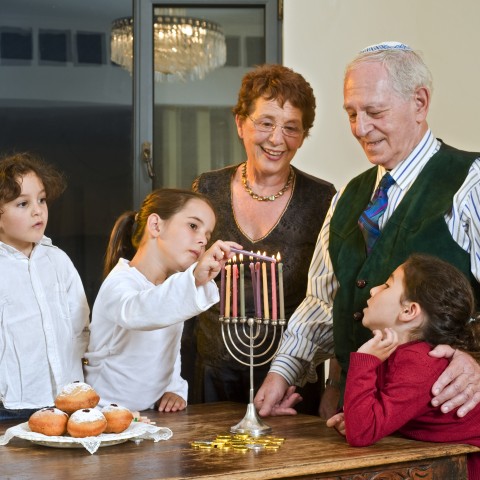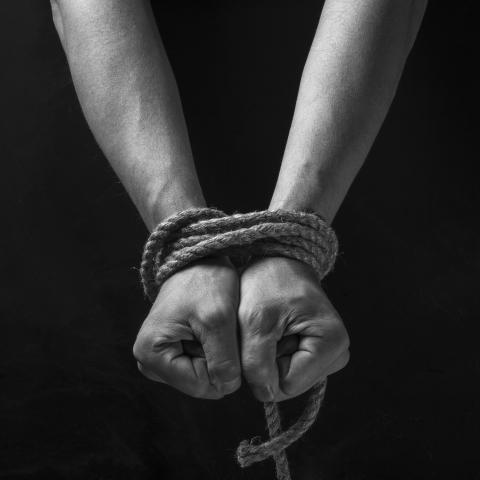One of the best ways to study any language is to expose yourself to real language as used by native speakers in natural, day-to-day contexts. Obviously, immersion is the most effective way to manage this, but not all of us have the opportunity to live in a country where the language we’re learning is spoken.
That’s where TV in Hebrew can come in handy. You can use this as a highly practical tool to expose yourself to native speech. In fact, even if we are staying in the country of our target language, or among natives of that country abroad, TV shows and movies have a certain advantage in that they allow us to pause and replay segments we wish to hear again—unlike people in real life, who tend to resist getting paused and replayed!
Another advantage of watching Israeli TV series is that they generally offer language learners very idiomatic language, as opposed to the more formal or fancy language you might encounter in literature or on the news. For this reason, TV shows are a great way to expand your vocabulary with everyday words and expressions—including slang and colloquialisms—as well as pick up on nuances of pronunciation and inflection.
And it goes without saying that watching Israeli TV shows is a fantastic way to improve your listening comprehension! The best thing of all is that, provided you choose shows that you like watching, TV can make language-learning a fun and relaxing activity which has been proven to improve learning abilities.
Table of Contents
- Tips for Using Israeli TV Shows to Learn Hebrew
- Show #1: Ktzarim
- Show #2: Ha-Shoter ha-Tov
- Show #3: Fauda
- Show #4: Srugim
- Show #5: Eretz Nehederet
- Show #6: Slikhah al ha-She’elah
- Show #7: B’li Sodot
- Show #8: Mo’adon Laylah
- Show #9: B’ney Arubah
- Show #10: Ha-Gashash ha-Khiver
- HebrewPod101 is Here to Help You Learn the Fun Way!
1. Tips for Using Israeli TV Shows to Learn Hebrew
Before we take a look at the top ten Israeli TV shows to learn Hebrew, let’s first see some of the most effective ways we can put TV shows in service of our language-learning goals.
- The first thing to remember is that the very act of watching a TV show in Hebrew is going to help you learn passively. Basically, as long as you’re exposing yourself to the sounds, patterns, and rhythms of Hebrew as it’s spoken in modern-day Israel, you’re attuning your ears and your mind to the language.
- A very helpful way to both expand your vocabulary and improve your listening comprehension and pronunciation is to use subtitles while watching Israeli TV shows. For beginners, it may be easier to watch Israeli TV shows with English subtitles, but as soon as you’re comfortable, you should definitely switch the subtitles to Hebrew. While it’s useful to match up the English words you see on the screen with their Hebrew equivalents as spoken by the characters in the show, it will help you much more to watch Israeli TV shows with subtitles in Hebrew as you listen to the words being pronounced.
- A great way to work on vocabulary acquisition and pronunciation is to set goals for each episode you watch in terms of learning new words and phrases. Say you watch a forty-five-minute show, you can set a goal, for example, to learn ten new words and/or phrases. As you watch, just jot down any unfamiliar words or phrases as you come across them. You can either write the definition if you caught it, or look them up later. Then go and practice them!
- To practice pronunciation specifically, you can set a similar goal of words and/or phrases to practice. Listen for whatever language is tricky or confusing for you, and replay the segments so you can practice your pronunciation, matching it to the native speakers’ in the show. You can even take this a step further by recording the bits you want to practice with your cell phone, then recording yourself saying the same bits and comparing to see how close you’ve gotten.
- Test your listening comprehension on short segments by trying to write a transcript of what you hear a character, or various characters, saying. Obviously, you want to either not look at the screen or turn off the subtitles while you do so. Then, watch the scene again and check the subtitles to see how close you got.
- Utilize the language you learn in your speech. Watching Hebrew-language TV shows is a great way to pick up commonly used words and phrases in Hebrew. Try to grasp the appropriate context in which the words or phrases are used in the show, and use them accordingly when you speak Hebrew!
2. Show #1: Ktzarim
Let’s start with one of the best Israeli TV shows for learning Hebrew. This show, קצרים (Ktzarim) or “Shorts,” is a hilarious sketch comedy with the same five actors in a seemingly endless variety of roles and situations. The quintet includes award-winning actor Moni Moshonov, who has appeared in various English-language movies as well, alongside Keren Mor, Shmulik Levy, Riki Blich, and Yuval Segal. The best way to catch this show is on YouTube, where many full episodes as well as sketch segments are available free of charge.
This show doesn’t have any particular theme, and is based, as its name suggests, on very brief comic sketches, ranging from a few seconds to around a minute long. Generally speaking, the characters in these sketches go by their real names (first name only), and can be seen portraying just about anyone.
The main advantage of this show for language learners is that, because the sketches are so short, they provide a great opportunity to focus on listening comprehension for small chunks of language. You can definitely take advantage of their short length by doing some repeated listening and/or repeated speaking to learn new words and phrases.
3. Show #2: Ha-Shoter ha-Tov
One of the greatest Israeli TV shows on Netflix, השוטר הטוב (Ha-Shoter ha-Tov), or “The Good Cop,” is another Israeli comedy show, albeit with full-length episodes rather than sketches.
The show follows policeman Dani Confino and his fellow officers through one misadventure after another. For example, due to what’s deemed to be violent and uncontrollable behavior, Dani is sent to meet with a psychologist to talk about his issues. The scenes with the psychologist are frequent and quite funny. The series also follows Dani’s dysfunctional relationships with his parents, as he moves back in with them after finding out that his girlfriend has been cheating on him.
The show features Yuval Semo as Dani, Leora Rivlin as his mother, Moshe Ivgy as his father, Guy Loel as the station chief, Yigal Adika as Dani’s partner, and Ortal Ben Shoshan as Dani’s co-officer and eventual romantic interest.
This show offers a great opportunity to pick up day-to-day Hebrew, including slang and colloquialisms. You can also note the different accents and dialects that are featured, from Dani’s more or less standard Tel Aviv accent to his partner’s Oriental Jewish accent to Dani’s father’s Morrocan accent.
4. Show #3: Fauda
פאודה (Fauda), or “Fauda,” is an absolute must-see. The name of this action-packed Hebrew TV series is actually in Arabic, and means “chaos.” It’s interesting for both its storyline and in linguistic terms.
This show deals with IDF officers involved in Israel’s undercover security operations to track and capture terrorists within the Palestinian territories. As undercover agents, all of these characters (and thus the actors who play them) must speak perfect Arabic, so the show is a good opportunity to hear both Hebrew and Arabic and to note the differences between them. Fauda is available to stream on Netflix.
Fauda stars a number of noteworthy Israeli actors, such as Lior Raz as Doron Kavillio, Itzik Cohen as Captain Gabi Ayub, Yuval Segal as Mickey Moreno, and Rona-Lee Shim’on as Nurit. It also stars Arab-Israeli actors and even French-Lebanese actress Laëtitia Eïdo as Dr. Shirin Al Abed.
This show is a great opportunity to pick up military lingo, which is a huge part of everyday Hebrew in Israel. This is because military service in the IDF is obligatory for all citizens, male and female, upon graduating high school. For this reason, there’s a lot of military jargon—often acronyms—that gets used even in non-military contexts. To give you an idea, here are a few examples of words you may hear on the show:
- פז”ם
Pazam
“Seniority” (literally the acronym for “time out” ) - שיפצור
Shiftzur
“Improvised repair or improvement” (formed from שיפור צורה, shipur tzurah, “improvement of form/shape” ) - ג’ובניק
Jobnik
“Non-combat soldier”
5. Show #4: Srugim
Srugim is a very interesting show that examines life within the so-called National Religious Community in Israel. Essentially, these are religious, observant Jews who are strong supporters of the modern state and participate fully and with distinction in the armed forces as well as the workforce, unlike their ultra-Orthodox counterparts.
In fact, this is the origin of the show’s title. The word סרוגים (srugim) means “knitted” or “crocheted” and refers to the style of כיפה (kipah), or “yarmulke,” that modern Orthodox Jews wear. The ultra-Orthodox tend to favor velvet or leather yarmulkes.
With well-known Israeli actors including Ohad Knoller as Dr. Nati Brenner and Yael Sharoni as Yifat, the show provides a fascinating in-depth look into the lives of Orthodox Jews living in the midst of a mostly secular Israeli society, as well as the dilemmas and choices they face. It’s unique in its attempt to portray this sector of society in an unbiased manner.
Srugim is a wonderful opportunity to learn Hebrew—not just useful daily Hebrew, but also Hebrew that pertains more to religious life, sometimes involving Biblical references (i.e. ancient Hebrew) or rabbinic sources (yet another strain of the Hebrew language).
6. Show #5: Eretz Nehederet
ארץ נהדרת (Eretz Nehederet), or “What a Wonderful Country,” is a satire show that’s similar to Saturday Night Live in that it includes sketch comedy with a notable political bent. Hosted by Eyal Kitzis, it also features such prominent comedic personalities as Tal Friedman, Alma Zak, Orna Banai, and Asi Cohen. It can be found on Netflix, with some episodes and clips available on YouTube. As with Ktzarim, since the show consists of sketches, it’s one of the most practical Israeli TV shows to watch if you want to work on comprehension or pronunciation.
As the show touches on all facets of Israeli life, all accents and dialects are represented, albeit mostly in a humorous vein. The show is also a funny opportunity to see and hear comic impersonations of various famous Israelis, from Prime Minister Binyamin Netanyahu to model Pnina Rosenblum.
7. Show #6: Slikhah al ha-She’elah
סליחה על השאלה (Slikhah al ha-She’elah) means “Sorry for Asking.” As far as TV shows in Hebrew go, this one is quite unique in that the premise of the show is to ask difficult or uncommon questions received by anonymous submissions from viewers. For example, episodes may feature people who have at some point been members of a cult or people who use a wheelchair, who are asked to field a number of challenging questions.
The show does not have any set cast, as it merely shows the interviewees for each episode, with each episode having separate interviewees. In addition to providing a wonderful opportunity to hear from different—and perhaps unusual—perspectives within Israeli society, watching this show is also a fantastic way to practice questions in Hebrew! You can watch it on YouTube.
8. Show #7: B’li Sodot
This show, בלי סודות (Bli Sodot), or “Without Secrets,” is a children’s show, so it may not be for everyone. However, if you really want to work on the basics of Hebrew vocabulary and grammar, this is a great choice as far as children’s TV shows in Hebrew go. Its goal is to help teach Israeli children to read, and because it’s geared toward children, the actors—including Oshik Levi and Hanny Nahmias—tend to speak very slowly and clearly.
The show features songs and sketches which are all in some way related to words and reading, so its educational value is unquestionable. Obviously, however, it does tend to deal with juvenile topics and situations, so you may wish to limit how much you use this one for learning. It does, however, contain some great elements that can surely be helpful if you take the show as lightly as it was intended. For example:
- The recurring character Itonaish plays a game where he must identify syllables in order to match up the ones that go together and determine which one doesn’t fit.
- Words learned in a previous sketch are repeated, broken into syllables for ease of comprehension.
- The recurring character Alphy creates words learned in previous sketches. Children read out the words, and in some cases Alphy removes the nikud, much to the children’s initial dismay, but later pleasure, as they realize how to read without the vowels being indicated.
9. Show #8: Mo’adon Laylah
מועדון לילה (Mo’adon Laylah), or “Nightclub,” is another Israeli satire show, hosted by Erez Tal. This show features panelists—including Ofer Shechter, Israel Katorsa, Maya Dagan, and Tal Friedman—who comment satirically on various daily events, often responding to short video clips.
This show is a great way to have fun while getting to know all about Israeli politics, celebs, sports, and more. It’s also another opportunity to expose yourself to a broad array of language, as well as different accents and dialects, including in impersonations. This show is available on YouTube.
10. Show #9: B’ney Arubah
בני ערובה (B’ney Arubah), or “Hostages,” is a thrilling Israeli series that follows a family that’s taken hostage by armed men who attempt to force the mother, a prominent surgeon, to intentionally cause the prime minister’s death by botching a surgery she plans to perform on him.
Starring Ayelet Zurer as Dr. Yael Danon and Jonah Lotan as Adam, the series was so popular it was acquired by BBC to be remade in English. This show features many highly intense scenes with rapid exchanges between characters, so you can consider it advanced listening comprehension. It’s available on Netflix.
11. Show #10: Ha-Gashash ha-Khiver
Saving the best for last, this one isn’t actually confined to one show. הגשש החיוור (Ha-Gashash ha-Khiver), or “The Pale Tracker,” was a longstanding comedy trio that can perhaps be considered the most important comedic influence in modern Israeli society. The trio consisted of Yeshayahu Levi (nicknamed “Shaike”), Yisrael Poliakov (nicknamed “Poli”), and Gavriel Banai (nicknamed “Gavri”). The three produced shows, movies, and records, many of which are widely available on YouTube.
This comedy is not only brilliant but also very linguistically oriented. In fact, Ha-Gashash ha-Khiver probably influenced the modern Hebrew language much in the way the plays of Shakespeare revolutionized the English language. Plays on words, spoonerisms, neologisms, and just about every other form of language manipulation, are a regular part of the trio’s approach to humor.
The trio very often does impersonations or impressions, and even has skits about language itself. Watching these three comedians is a guaranteed way to enrich your Hebrew and laugh while doing so, while also getting great exposure to different accents and dialects.
12. HebrewPod101 is Here to Help You Learn the Fun Way!
We hope you’ve enjoyed today’s change of pace. We here at HebrewPod101 are committed to providing you with learning materials that keep you interested and having fun. We know how important it is to the success of any language-learning endeavor to enjoy the process. For this reason, we try to include as much fun as we can.
As we hope you can see, Hebrew TV shows are a fantastic way to bolster your more academic lessons. By no means should you consider them secondary. On the contrary, exposing yourself to real-life Hebrew is just as important as hitting the grammar books!
There’s no better way to work on your comprehension and pronunciation than by hearing and imitating native speakers. Why not do so while enjoying a great Israeli TV show? Consider it a two-for-one: entertainment and education all in one sitting. Just don’t forget the popcorn—in Hebrew, פופקורן (popkoren)!
Which Hebrew TV show do you want to watch first? Let us know in the comments!

















